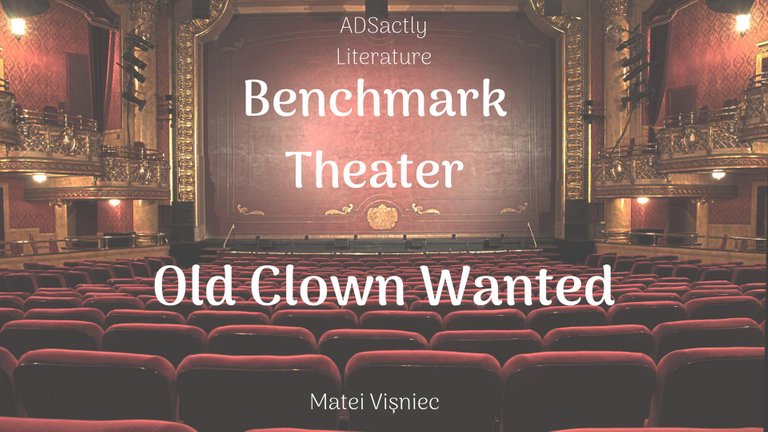
Hello dear @adsactly theater lovers,
It’s been a while. Mainly because I wasn’t sure what play to approach for you this time. I spent a long time deciding, reading, choosing and in the end, settled on a play you very probably don’t even know. But that needn’t matter, this series should be about discovering new things, as well as learning about some old.
Today, I’m talking about Matei Vișniec’s “Old Clown Wanted”. It’s a relatively new play, definitely newer than the plays we’ve looked at so far in the series, but it is a child of Pirandello and Beckett and Ionesco and all those other absurd masters.
Matei Vișniec, for those of you who don’t know him, is a big playwright in my country and a well respected name in the European literary world. Reading up on him a little, I see we share a birthday - 29th of January, albeit some forty three years apart – as well as a birthplace. Born in 1956 in Romania, Vișniec is mostly known for his writings in the French language (he lives in France at the moment and has, for some time).
Actually, the play we’re talking about today was written around the time he moved to France, from what I understand.
“Old Clown Wanted” is a play that has followed me like a guiding star when I crossed Europe from East to West, when I moved from one cultural space to another, from a language to another, in search of a new identity.
I wasn’t really sure about writing this post, as it’s a pretty difficult play, but reading the author’s blog on the subject convinced me. I just enjoyed his writing so much.
Right, back to the play. “Old Clown Wanted” tells the story of three aged clowns, Nicollo, Filippo and Peppino, who meet again in front of a large door. They’ve all come to try and demonstrate their talent and skills, in hopes of being hired with the circus.
The three are old friends, they talk of people they knew long ago, they joke, they argue. They each perform their own little routine in front of the two other clowns. Routines that are old and tired, much like the clowns themselves. They work hard to prove, both to the others and to themselves, that they are still young enough, that they can still do the job, be funny, stay relevant.
And of course, this struggle is as tragic as it is funny, at times.
The last one to “show his skill” is Peppino, who fakes his own death, much to the dismay of the other two clowns, who try everything to bring him back. When they discover it was all just a big trick, they begin hitting the clown and end up killing him for real.
The play ends in a sober mood and I remember sitting in the audience at this play, sometime last year, wondering if he’d really died. And I’m not one who gets confused easily.
The two remaining clowns-turned-murderers exchange a conspiratorial glance and proceed to drag Peppino’s body behind the big door, where we find the corpse of another clown, with his own little tattered suitcase (like the ones the characters themselves carry throughout the play).
According to the author himself, the play was largely inspired by Federico Fellini’s lighthearted semi- documentary “The Clowns” in which Fellini follows some old, ill, even insane clowns. It’s also the result of Vișniec’s childhood fascination with clowns and the circus in general. As he tells it, it was always a special feeling when the circus caravan came to his town.
Of all the circus artists, I loved the clowns the most. They were, for me, some sublime messengers, that made us laugh, while sending thousands of simple, yet touching messages. That life is both laughter and crying, that inner freedom can, at some point, break the walls of an external prison.
It’s a story about being old and tired, even though the author wasn’t technically old at the time. He explains the stagnant feeling that took over him, how tired he was of living thirty years under communism and the feeling of helplessness at what was happening with his country.
As he tells it, he wrote “Old Clown Wanted” at a crossroads in his own career, where he was tired and needed to vent in just such a biting commentary.
Mostly, it’s a story about life and about a terrible wait that exists in us all. We can all identify with the three old clowns, waiting at the door, doing their best to prove their worth, that they still mean something to this world. Though as the play progresses, we understand that what they’re not actually waiting for the door to open and the audition to begin, but rather for their own deaths.
Anyone can be Peppino. There are thousands of Peppino. Everyone is Peppino.
I think this line from the play pretty much tells us everything we need to know – that we are all old clowns, at some point. Not necessarily when we’re old. As Vișniec himself points out, the play has been staged in many different ways and not just by old people. Both young actors and young directors have taken on the challenge, which just goes to show that the feeling of tiredness inherent in the play is not something unique to old people. The playwright himself was only thirty years old when he wrote “Old Clown Wanted”.
It’s a play about the very essence of humanity. It’s about losing hope. In yourself, as well as the world around. It’s about being lonely and scared and tired. Which is why I think it’s done so well, both in Romania and in many other countries across the globe.
Excerpts from the play can be found around the Internet and I highly encourage you to check them out. Better yet, if the play is on at one of your local theaters, do consider seeing it. It comes with a strong, resounding message and I guarantee you won’t be disappointed.
Have you seen “Old Clown Wanted”?
Authored by @honeydue

Click the coin below to join our Discord Server
)
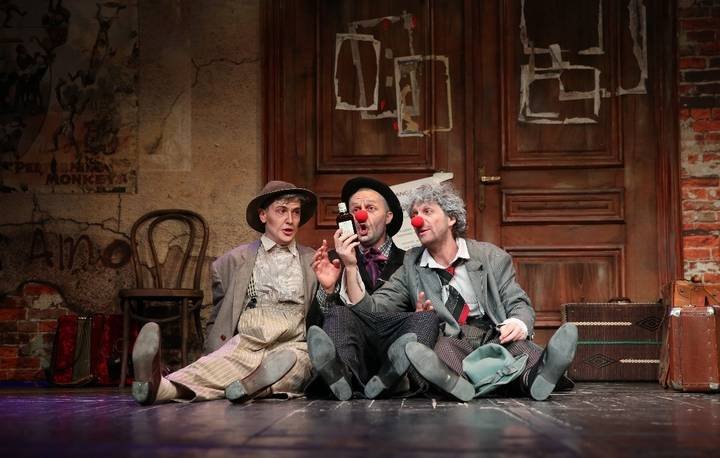
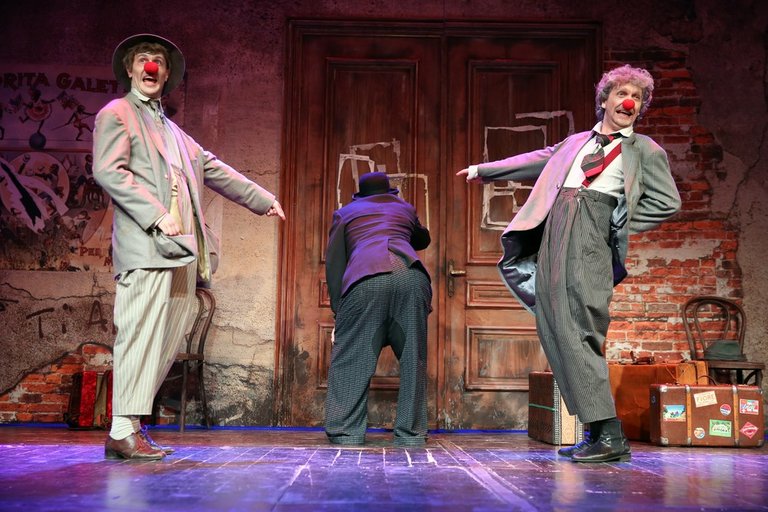
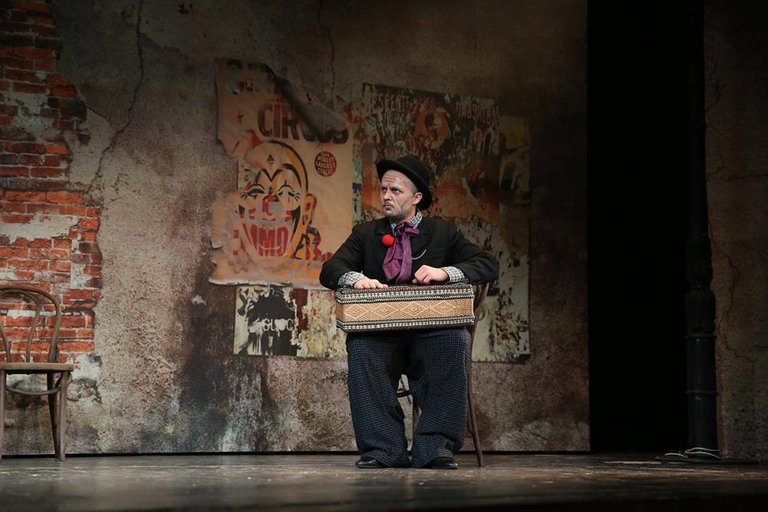
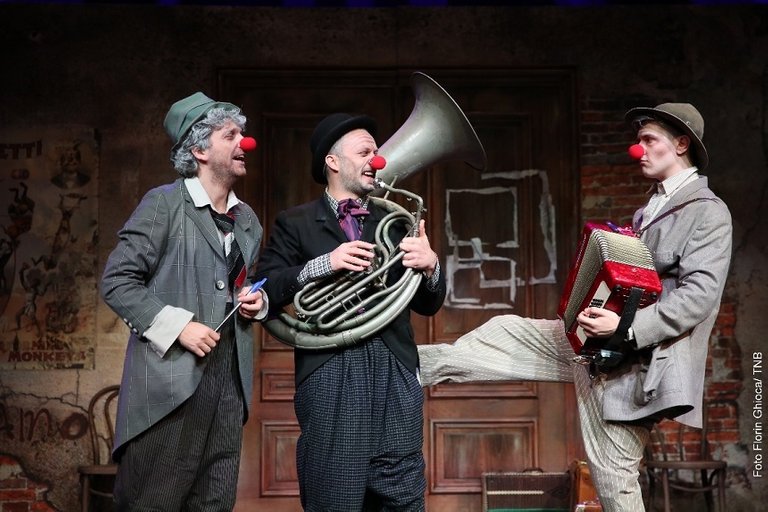
This work must be on the list of works I must see someday. I am fascinated by the theme and the plot you have developed here. I imagine that not only will it be drama, but there will be a lot of comedy and reflection. In particular, clowns scare me a lot (I must have some unresolved childhood trauma. LOL) and I've always found them to be very sad characters. The idea of keeping an eternal smile on my face, even if it's sad, seems more like a tragedy to me. As for the plays that invite us to reflect and leave us suspended, it seems to me that they are the best. The audience is shaken from their seats to their roots. Excellent post, @honeydue.
What a wonderful post! You surprised me @honeydue. First I must say that I have not seen "Old Clown Wanted". For all the description, which you made here, be certain that when I see it on the billboard (sometime in my life) I will see it. The message is very strong or I am very sensitive. Being alone or overwhelmed and not losing hope. Being tired but standing and with an absurd clown smile (Fellini). This play of drama is truly tragicomic. Receive my best regards @honeydue
This is definitely a play I would not be able to see with my wife. She hates clowns.
One thing this series has allowed me to appreciate is how much I have missed all these years by neglecting drama in my literary studies.
Usually, emphasis is given to the classic works, but I have discovered incredible treasures in contemporary drama. I thank you for that.
I have fond memories of clowns performances in circuses that visited my home town. Slapstick humor can be very funny, especially for children, but we know how much tragedy is involved in the clown business itself. We have an old salsa song that talks about the "poor clown who laughs to avoid crying".
I am not surprised the author wrote this play as a result of his reflexion on political matters resulting from an oppresive regime. Politics do that to people. It ruins their spirit, but it also inspire reactionary art.
Politics ruined most of the comedy shows in my country. Some standup comedians even stopped performing to avoid political persecution.
The message of the play is a poignant one. We all perform to gain life’s approval, to be liked and loved and recompensed and often times people fight their competition and plot to destroy anyone who might represent a threat, even if imaginary. People kill for attention every day.
Hi, @adsactly!
You just got a 0.31% upvote from SteemPlus!
To get higher upvotes, earn more SteemPlus Points (SPP). On your Steemit wallet, check your SPP balance and click on "How to earn SPP?" to find out all the ways to earn.
If you're not using SteemPlus yet, please check our last posts in here to see the many ways in which SteemPlus can improve your Steem experience on Steemit and Busy.
The freedom of expression and diffusion of art was so blocked in times of Soviet totalitarianism in the countries of so-called "real socialism" that our access to fundamental writers from that part of Europe was almost nil. Visniec perhaps I saw him name it that way, but nothing else. And less to know his work, as is the case of Old Clown Wanted.
Because of what you offer us in your very good post, @honeydue, this work develops a very ironic vision (between sarcasm and absurdity) about life in a closed society, in front of which perhaps we are left with a biting, desolate and, finally, sad laugh. Despite the distances, I thought of Heinrich Böll's novel, Opinions of a Clown.
Sometimes I think I have read an opinion of Milan Kundera, where he defended the rebellious character of laughter in societies like the Stalinists. Although sometimes laughter, like the clown, carries sadness inside.
Thanks for your post, @honeydue.
PS: About works from that time, I was thinking of Sartre's Flies and Camus' Misunderstanding (as well as Anouilh and Fo).
we are all old clowns, at some point. Not necessarily when we’re old
Very existential. I do often feel like I am waiting for some unknown thing to happen.
Sounds like an interesting play, I'll look into it. Thanks for writing about it.